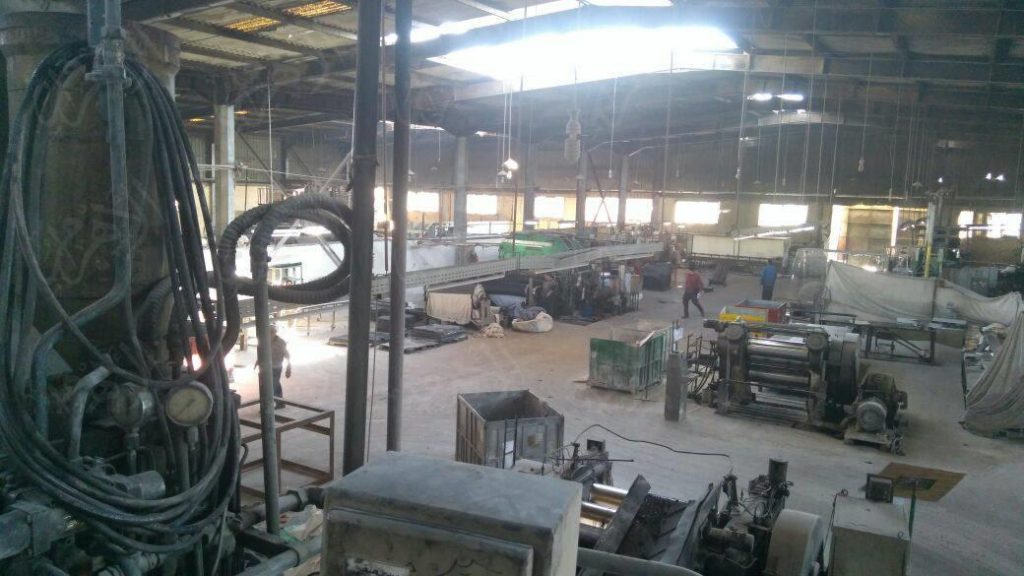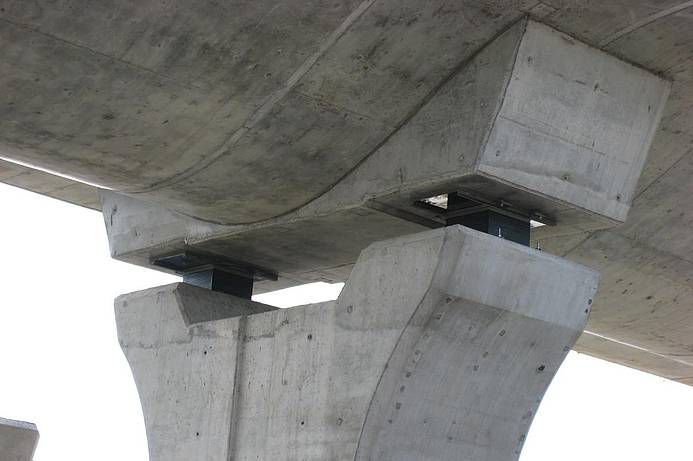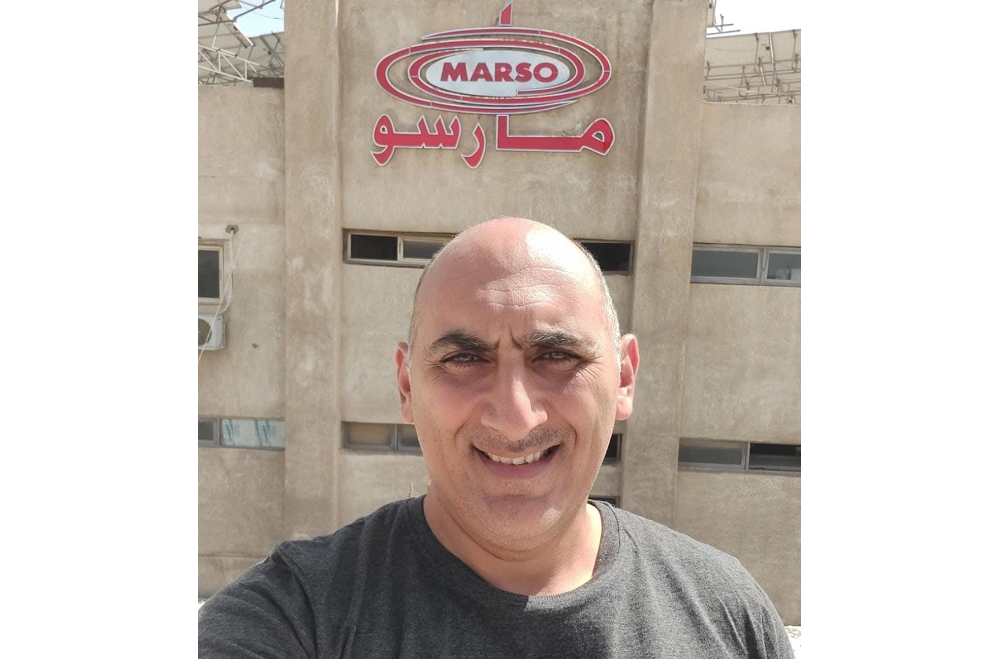The history between Egyptians and tyre recycling started as simple native trials to make use of worn out tyres. In “Meet Elharoun” Village, a part of Algharbia governorate in Delta region in Egypt, the whole village works on tyre recycling.
For 70 years, the people of this village used to collect worn out tyres, to cut them manually and make rubber strips from the tread and fix them on the crown of wooden wheels of horse-drawn carts. They also make rubber bumpers used on truck loading areas, and marine buffers. They also make rubber buckets used in construction.
In 1968, Marso started the first modern factory for tyre recycling in an industrial zone, near to the centre of Cairo, explained Mr. Samuel Mofied CEO of Marso Company. This was after many studies and trials done by two members of the family, the two brothers were about to lose all their capital in the trials, but finally the last trial proved to be a success, so they started their first factory with simple non-automated equipment.
The idea to recycle worn out tyres came after studies about the Environmental Impacts of waste tyre disposal
The idea to recycle worn out tyres came after studies about the Environmental Impacts of waste tyre disposal, they thought how to overcome the negative impact, and generate income. “Just sitting in the sun, a waste tyre releases methane gas into the air,” added Mofied; “Just setting tyres on the ground for an extended period is enough to kill beneficial soil bacteria. Flora and fauna depend on the nutrients these bacteria produce for nourishment. Without the bacteria, plant and animal species lose habitat and die off.”
Mofied added that it is expected that the world demand for worn out tyres is around 4 Billion tyres, but in Egypt, the formal figures released from the “National Program of Waste Solid Recycling”, estimates that the quantity is around four hundred and fifty thousand tons, fifty per cent of the latter is recycled to final products, twenty eight per cent is transferred to fuel (TDF), eleven per cent is recycled into other products, and five per cent burnt.

Marso managed to create new end-products such as shoe soles, car pedals, rubber hoses, etc. Since early 1968, Marso shareholders decided to approach the high quality demand for their products; they managed to win the trust of many users and dealers. After dominating the market as pioneers in their sector, in 1988 Marso decided to develop more the business by moving to a new Industrial area, in Ramadan City, 50 km northeast of Cairo. That shift was accompanied with an equipment update, aiming towards a higher quality refined product and amass production level, at that time Marso used to buy not the full tyre but only the tread without steel wires, they used to buy the tread from “Meet Elharoun” village dealers.
Imported the first tyre shredder into Egypt
In 2010, Marso introduced the first tyre shredder to Egypt. A primary shredder that cuts rubber into a 5 x 5 cm sections, then to a secondary shredder to cut the rubber into 1 x 1 cm section, then to a machine that cleans the wires from the rubber, then to a magnet that separates the wires from the rubber, then to another cleaning machine that reaches a 99.50 per cent wire free rubber. The machinery development programme is ongoing at Marso, to achieve more accuracy in the technical specifications of the product and to deliver higher productivity.
Asked what the main challenges to production were, Mofied responded; “The lack of ELT feedstock, and expert technicians, and the lack of the natural and synthetic rubbers. We need at least twenty per cent of the production mass from those two products, to maintain our quality level of the durability of the final product.”
The steel wires are sold to steel factories, and the rubber powder or granules are processed to final products.
There were two changes in the rubber market; the first when the cement companies decided to use tyre derived fuel (TDF), one ton of worn out tyres produces 700 kilograms of derived fuel. This resulted in tyre dealers starting to sell full tyres to the market and stopped cutting the tread and selling it to Marso. The second is the startup of many new tyre recycling factories, both led to a move in the raw material to full ELT, rather than tread strips.
Marso’s owners had sufficient knowledge and expertise to decide what kind of machinery to buy from Europe, and they trained their 150 technicians to operate the machinery, without any technical support from the machinery supplier.
Mofied explained that concentrated training is given to any fresh staff before he is given the responsibility of operating the machine. The technicians mostly graduated from industrial technical institutes, not college graduates. The college graduate engineers are in charge of production lines, and the Research & Development department. The R&D department consists of a laboratory that can do physical and chemical tests for the end products; the know-how of the laboratory is European.
Feedstock collection is important
Collection of feedstock is important, Mofied says; “We rely on tyre dealers and collectors, and after the rise of TDF, the demand on ELT increased rapidly, the price increased as well, so as our objective in Marso is always to concentrate on delivering a high-quality product. We decided to rely on ELT dealers, to take care of our supply, and keep the focus on our main goal.”
Regarding the marketing activities of Marso, Mofied explained that they have three retail outlets, two inside Cairo and the third is at the factory, they have a sales team handling Business to Business products like ships fenders, non-skid flooring, insulators for electricity, and fireproof floors, bullet proof products; also, Marso exports the recycled rubber to foreign factories producing comparable products.

With regards to bridge bearings and bridge pillars, Marso got the approval of a local engineering consultancy office about the specification of those two products; as a result, they were able to sell them to construction companies, as a participation in the Mega Construction campaign going on in Egypt nowadays.
Competition from imported goods is a challenge
Marso’s locally made products managed to penetrate the Egyptian market, the company was able to gain a market share and halt similar imported comparable products, Mofied explained; “Yes for a period of time, until local importers got equivalent products from China to compete with us on price, but we always have a backup plan with new products. Lately a similar Chinese product made of plastic rather than rubber has been competing in the market. Plastic is cheaper than rubber. Our products are not contaminated, whilst imported products can be contaminated. We have communications with the “Import Control Authority” who execute the laws and legislation in that regard, to protect citizens and local industry. Moreover, we deal with the competition through widening the range of our product line, because some of our products are seasonal, so we surpass our competitors with our capability to provide more products to the market and ensure customer satisfaction and loyalty. We have ISO 9001, 45001, 16949 and 15001, on the process to maintain quality.
Marso exports its products to Middle Eastern and African countries, mainly South Africa, Turkey, and Greece. Exports help them acquire the foreign currency that they need later for the import of their raw materials. Still, they face challenges in competition in those foreign markets, but their marketing strategies to overcome those challenges are, keep and develop the quality level, respect the delivery time and other sales contract terms, and quote reasonable prices.
Due to such challenges, Marso considers themselves to deserve the “Export Support Programme,” they understand the government policy towards choosing some selective products, to support the local exporters within the “Export Support Programme,” rubber products are not included in that programme, so Marso are expecting to benefit from this programme soon, as the result of communications with the governmental officials.
Mofied responded to a question about the energy used to operate his factory machinery, he mentioned that they use both electric and gas, they even proceeded further by installing Solar Panels on the surface of the factory, to produce part of their needed energy requirement.
Answering a question about the philosophy of Success, from the point of view of Mofied the CEO of Marso Company, he answered; “Study well the needs of your markets, upgrade your equipment, know-how and raw material, Satisfy the new needs of your clients, Prospect new clients and markets. Believe that impossible is nothing, be tough enough to overcome challenges, at the end of the line, you will earn self-satisfaction, and this is what it is all about.”
Byline: Rafik Kosman




















